Politics
Nigerian senators clash over regional government proposal
Published
4 months agoon
By
Ekwutos Blog
Nigerian Senators from both Southern and Northern regions have expressed differing views over the agitation for the return to a regional system of government.
They shared their opinions at the sidelines of a two-day retreat on the amendments to the 1999 Constitution, organized by the Senate Committee on Constitution Review in collaboration with the Policy and Legal Advocacy Centre (PLAC) in Kano.
While senators from the northern region vehemently opposed the idea, those from southern Nigeria described it as a welcome development that would improve the economy, tackle insecurity, and accelerate infrastructural development.
However, the Senate Leader, Opeyemi Bamidele, assured Nigerians that the issue of regionalism was not part of the ongoing constitution review.
A ranking senator from Bauchi Central Senatorial District, Abdul Ningi, told journalists that his people would never support the idea because they did not experience any form of development when the system was practiced during the defunct First Republic.
Ningi said, “I have heard so much about regional government or federalism, and I have heard people canvassing for such ideas.
“For a start, no matter how you see it, the current document (1999 Constitution) is still the grundnorm. It has also stipulated how it is going to be amended.
“Having said that, it is also imperative to know that it isn’t just enough for anybody to come and say they are the representative of one ethnic group or another at the National Assembly.
“The question that arises is: when was this mandate canvassed? When was it received? You are a representative of a particular ethnic group in Nigeria, at what time were you given the mandate to canvass that?
“The only people that are given this mandate to look at the Constitution and amend it are, of course, members of the National Assembly.
“Therefore, it is important for those who go about selling these ideas, false ideas in my opinion, that they are representatives of the people, to let Nigerians know where they are coming from, on whose mandate, and when was this mandate given to them.
“We have seen how the regional government was operated in the past. My part of the country that I am representing didn’t enjoy the development of that so-called regional government that was based in Kaduna.
“We aren’t going back there again! I am speaking for my senatorial district. It is either the Nigerian Federation or nothing. We can’t go along; my senatorial district will be satisfied independently with Nigeria, if that is what is required.
“As far as regional government is concerned, my constituency, my people aren’t for it. What we need is reform of the current Federal Government structure and fiscal federalism because there is nothing like true federalism.”
The Chairman of the Senate Committee on Finance, Senator Sani Musa, advised Nigerians against mistaking the establishment of zonal development commissions for regionalism.
He said the various geopolitical zonal development commissions were strictly for the social and economic development of their areas.
He said, “It is wrong for anybody to think that the development commissions being established for the six geopolitical zones are a plan towards regionalism. It is not.
“Those who are advocating for it should come up with bills through their representatives in the National Assembly and test the popularity of their proposal.”
Similarly, former Senate Leader Ali Ndume said the idea of true federalism was no longer fashionable because many countries in Africa had discarded it.
He advocated for the creation of strong institutions that would enhance good governance and curb corruption and insecurity.
“When the government puts these in place, there won’t be clamour for true federalism because there will be justice, equity, and fairness in all regions of the country.”
The Chairman of the Senate Committee on Tertiary Institutions and TetFund, Senator Muntari Dandutse, representing Katsina South Senatorial District, also disagreed with the proponents of regional government.
He said the essence of the ongoing retreat was to improve on the defects and anomalies discovered in the nation’s constitution over the years.
He said, “We should not have myopic thinking about ourselves. There is no section of this country that is not blessed.
“What is important is that we should have good governance and credible and responsible access to the resources that we have because Nigeria is blessed.
“We have all the comparative advantages that will move this country forward unless, of course, we are serious and determined.”
However, Senator Abdulfatai Buhari, representing Oyo North Senatorial District, disagreed with those condemning the regional system of government.
Buhari said, “Recall that the regions were able to harness their resources in the First Republic.
“We were able to harness all our resources. There was no dominance of particular resources.
“In those years, the North was known for the groundnut pyramids, the South West for cocoa. We should be able to do that.
“When you make the center less attractive, you cut off corruption. You can’t wipe it off, but you can cut it down, because there is what is called ‘watch your team.’ People will watch their team within their locality or within their region.”
Asked whether the South West region had a specific agenda for the ongoing constitution review, Buhari said it would be presented at the appropriate time.
He said, “We don’t want to disclose that agenda yet, but we have agreed among ourselves that the person who will present it is the Chairman of the South West Forum when the time comes. It would be very unfair for me now as a member to start discussing that.”
However, the Senate Leader emphasized that the issue of regionalism could not be changed through a constitutional amendment.
He said, “There are some decisions in the state where an executive bill cannot come to the parliament unless there is some political consensus.
“For me, going back to a regional form of governance is something that will go beyond a bill being sponsored, either as a member’s bill or as an executive bill.
“It’s also not something that you sit down in a public hearing room and organize a public hearing to take a decision on.
“An example is when people say, ‘Oh, you are in parliament. As a parliament, you cannot discard the entire constitution. Nigeria needs a new constitution because this one cannot work.’
“It’s easy for people to make such arguments, but that is not something we can sit down in parliament and do.
“We aren’t changing the constitution because that would require political consensus, and it would also require the buy-in of the Nigerian people themselves.
“Why is it so difficult to amend even one section of the constitution, let alone discard the entire constitution?
“To amend a single provision in the constitution today, the National Assembly and all chambers have to go through this entire process, which we go through in every legislative assembly, and many of you have been a part of this process.”
You may like
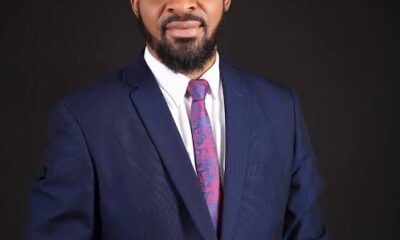

Deji Adeyanju Speaks Out Against Crypto Investments


LAND OWNERSHIP IN NIGERIA: SETTING THE RECORD STRAIGHT- Hon Success Opara


Renowned Comedian Alibaba’s Spouse Shares Enchanting Snap of Their Trio of Bundles of Joy to Commemorate Their First Year of Life


Victor Osimhen Responds to Allegations of Assaulting Turkish Journalist
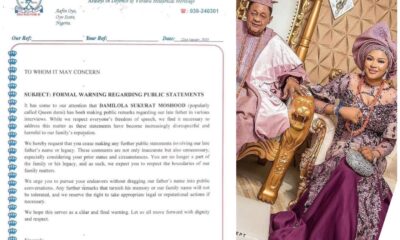

Stop dragging our father’s name into public conversations- late Alaafin of Oyo’s children threaten legal action against Queen Dami
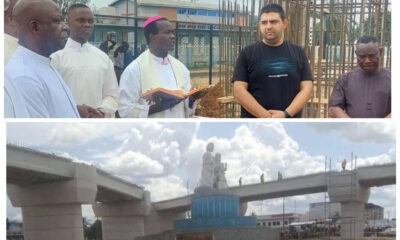

ASSUMPTA FLYOVER: CAN URGES RELIGIOUS AND COPORATE BODIES TO COOPERATE WITH IMO GOVT
Politics
‘Playing with fire’: Orbán’s sanctions veto threat puts Brussels on edge
Published
7 hours agoon
January 24, 2025By
Ekwutos Blog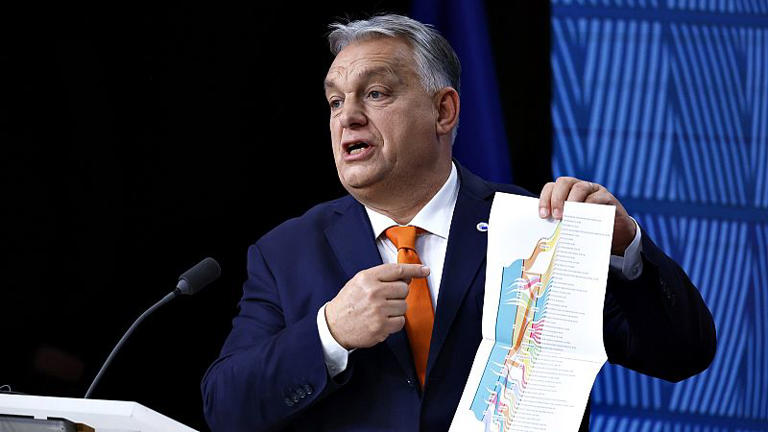
Diplomats and officials in Brussels are holding their breath as they wait to find out if Viktor Orbán’s increasingly critical rhetoric against EU sanctions will translate into a veto that could upend the bloc’s Russia policy, as soon as next week.
Since February 2022, the bloc has brought in sweeping bans on trade with Russia in energy, technology, finance, luxury goods, transport and broadcasting, among others. It’s also frozen €210 billion assets held by the Russian central bank within the bloc, which have been used to back a multi-billion-euro loan for Kyiv.
Those could all soon be put into question. The restrictions, designed to cripple Moscow’s ability to finance its full-scale invasion of Ukraine, need to be prolonged every six months by unanimity, and the next deadline is 31 January.
In recent days, Orbán and his deputies have ratcheted up their harsh words against the sanctions regime, arguing the inauguration of US President Donald Trump, who wants to negotiate with Russia’s Vladimir Putin, requires the bloc to rethink its longstanding stance.
“The question of extending the sanctions is now on the agenda, and I pulled the handbrake and asked European leaders to understand that this cannot be continued,” the Hungarian Prime Minister said in a radio interview on Friday morning.
One of his ministers, Gergely Gulyás, has openly questioned the six-monthly renewal. “So far, everyone has seen the extension of sanctions as automatic, but we do not think it is automatic now,” Gulyás said on Thursday.
Those comments have stoked fears that Hungary will use its veto to block the rollover, triggering the collapse of a sanctions regime painstakingly built across 15 packages, and depriving the EU of its most hard-hitting tool against the Kremlin.
“It’s clear that if Budapest were to block, we would have a great issue at hand,” said a senior diplomat, who spoke on condition of anonymity due to the sensitivity of the matter. “Budapest is playing with fire.”
The diplomat described the political situation as “mind-blowing” given the dire battleground conditions faced by Ukrainian forces, and predicted the EU would plunge into “uncharted territory” were sectoral sanctions to collapse overnight.
“The shenanigans we get from Budapest are seemingly endless,” the diplomat said.
A closed-door discussion among ambassadors on Friday only increased the uncertainty, as the Hungarian representative maintained ambiguity over his position, several diplomats said.
Instead, Hungary asked to change the agenda of Monday’s meeting of foreign affairs ministers, to allow the item on sanctions renewal, which is generally approved without any fuss, to be openly debated after a separate discussion on Ukraine support.
The Hungarian envoy also made a number of requests concerning energy policy, and in particular Ukraine’s recent decision to terminate the transit of Russian gas through Hungary, another diplomat said.
The decision, taken by President Volodymyr Zelenskyy to stop Moscow from earning “additional billions on our blood,” has met with a furious reaction from Hungary and Slovakia, two landlocked countries that still purchase Russian fossil fuels. Earlier this month, Slovak Prime Minister Robert Fico threatened to use his veto power in retaliation.
‘Transactional’ diplomacy
In his radio interview, Orbán made a direct link between sanctions renewal and the gas dispute, and asked the European Commission to intervene in his country’s favour.
The Commission has said it has “no interest” in extending the transit of Russian gas.
“What is closed now, has to be reopened again. This is not a matter for Ukraine, it is an issue for Europe, an issue for central Europe,” the prime minister said.
“If the Ukrainians want help, for example sanctioning the Russians, then let’s reopen the gas transit routes and allow the central European countries, including Hungary, to receive the gas we need through Ukraine.”
The connection between the two issues has left diplomats scratching their heads, trying to figure out how severe the latest threat actually is. Orbán has previously used his veto to extract concessions, but never to provoke such a disruptive effect on sanctions.
“The threats are taken seriously. But it’s not the first time,” a diplomat said, decrying Hungary’s “transactional” manner of making demands.
“The EU cannot enter into panic mode every time somebody says something in Budapest,” they added. “We have learned to make a clear distinction between what we hear in Budapest and what happens in Brussels.”
The suspense is likely to last, at least, until foreign affairs ministers meet on Monday and Hungary’s representative, Péter Szijjártó, announces his country’s position. Diplomats speculate that, despite the harsh talk, Szijjártó will back down if he can secure new EU assistance for Hungary’s energy needs.
This will pave the way for the renewal to be approved, if not on Monday, then at least before the end of the month.
“We expect a positive result from that discussion. [Sanctions] are a key part of our strategy,” said a high-ranking EU official. The issue of gas transit has “nothing to do with sanctions on Russia. Sanctions on Russia are because of the aggression.”
Asked if Brussels was already drafting a Plan B, the official said: “We don’t envisage any other possibility than that it will be approved in the coming days.”
One factor certain to influence the discussion are the latest comments made by Donald Trump, who took some observers by surprise with hawkish comments against Russia.
“If we don’t make a deal, and soon, I have no other choice but to put high levels of taxes, tariffs, and sanctions on anything being sold by Russia to the United States, and various other participating countries,” Trump said.
“We can do it the easy way, or the hard way – and the easy way is always better.”
The EU is already preparing a 16th package of sanctions against Russia, with the view to approving them before the third anniversary of the invasion, in late February.
Politics
Donald Trump To Reduce Oil Prices Worldwide
Published
8 hours agoon
January 24, 2025By
Ekwutos Blog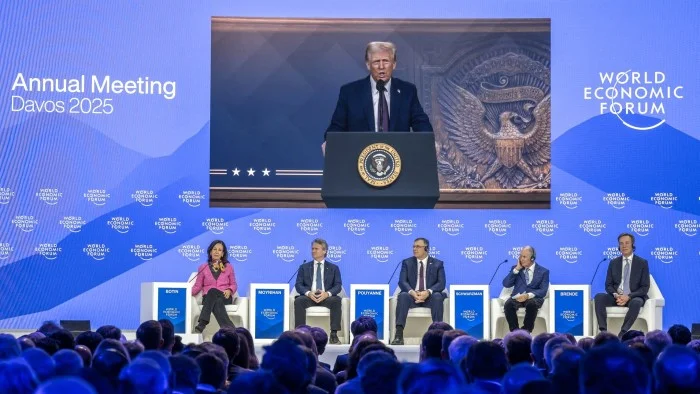
Donald Trump has reportedly urged Opec and Saudi Arabia to lower global oil prices and called for central banks worldwide to reduce interest rates immediately after.
Speaking to business leaders in Davos on Thursday, the former US president criticized oil producers for not acting sooner to reduce crude oil costs.
“I’m going to ask Saudi Arabia and Opec to bring down the cost of oil. You gotta bring it down. Frankly, I’m surprised they didn’t do it before the election,”Trump said.
He suggested that lowering oil prices could help stop Russia’s war in Ukraine, saying,
“Right now, the price is high enough that the war will continue. Bring it down, and you could end that war.”
Trump also encouraged global companies to manufacture their products in the US, warning them of heavy tariffs if they import goods into the American market.
He promoted his economic policies, including large tax cuts and reduced regulations, describing them as a “revolution of common sense.”
This is an ongoing story.
Politics
President Bola Ahmed Tinubu has appointed board chairpersons for 42 federal organisations and a secretary to the board of the Civil Defence, Immigration, and Prisons Services.
Published
12 hours agoon
January 24, 2025By
Ekwutos Blog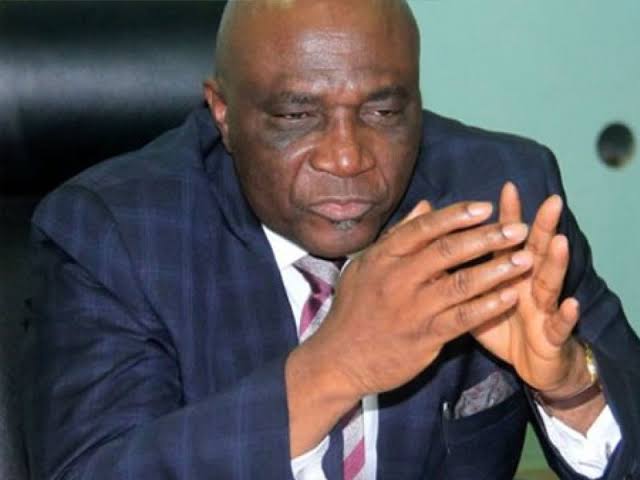
STATE HOUSE PRESS RELEASE
APPOINTMENT OF BOARD CHAIRPERSONS AND CEOS
President Bola Ahmed Tinubu has appointed board chairpersons for 42 federal organisations and a secretary to the board of the Civil Defence, Immigration, and Prisons Services.
The President has also appointed a new managing director for the Nigerian Railway Corporation and a director-general for the National Board for Technology Incubation (NBTI).
President Tinubu directs the board chairpersons not to interfere with the management of the organisations, emphasising that their positions are non-executive.
All the appointments take immediate effect.
1. NATIONAL YOUTH SERVICE CORPS, MINISTRY OF YOUTH DEVELOPMENT
– Hon. Hillard Eta Chairman (Cross River)
2. NIGERIAN INSTITUTE OF INTERNATIONAL AFFAIRS
– Prof. Bolaji Akinyemi, Chairman (Lagos)
3. FEDERAL AIRPORT AUTHORITY OF NIGERIA, MINISTRY OF AVIATION
– H. E. Abdullahi U. Ganduje, Chairman (Kano)
4. NATIONAL SUGAR DEVELOPMENT COUNCIL
– Sen. Surajudeen Bashiru Ajibola, Chairman (Osun)
5. NIGERIA BULK ELECTRICITY TRADING COMPANY
– H. E. Sulaiman Argungu, Chairman (Kebbi)
6. NATIONAL AGENCY FOR GREAT GREEN WALL
– Sen. Magnus Abe, Chairman (Rivers)
7. NATIONAL TEACHERS INSTITUTE
– Barr. Festus Fuanter, Chairman (Plateau)
8. NATIONAL BOARD FOR TECHNOLOGY INCUBATION (NBTI)
– Raji, Kazeem Kolawole, Director-General (Oyo)
9. NIGERIAN INSTITUTE OF EDUCATIONAL PLANNING AND ADMINISTRATION
– Chief Victor Tombari Giadom, Chairman (Rivers)
10. TEACHERS REGISTRATION COUNCIL OF NIGERIA
– Comrade Mustapha Salihu, Chairman (Adamawa)
11. INDUSTRIAL TRAINING FUND
– Hon. Hamma Adama Ali Kumo, Chairman (Gombe)
12. NIGERIAN INSTITUTE OF SCIENCE LABORATORY TECHNOLOGY
– Donatus Enyinnah Nwankpa, Chairman (Abia)
13. SHEDA SCIENCE AND TECHNOLOGY COMPLEX
– Sen. Abubakar Maikafi, Chairman (Bauchi)
14. FEDERAL MORTGAGE BANK OF NIGERIA
– H. E. Nasiru Gawuna, Chairman (Kano)
15. NATIONAL OFFICE FOR TECHNOLOGY ACQUISITION AND PROMOTION
– Sen. Tokunbo Afikuyomi, Chairman (Lagos)
16. NIGERIAN POSTAL SERVICE
– Chief D. J. Kekemeke, Chairman (Ondo)
17. NATIONAL INLAND WATERWAYS AUTHORITY
– Hon. Musa Sarkin Adar, Chairman (Sokoto)
18. NATIONAL STEEL COUNCIL
– Prof. Abdulkarim Kana Abubakar, Chairman (Nasarawa)
19. NATIONAL ENVIRONMENTAL STANDARDS AND REGULATIONS
ENFORCEMENT AGENCY
– Hon. Garba Datti Muhammad, Chairman (Kaduna)
20. NATIONAL BIO-SAFETY MANAGEMENT AGENCY
– Mu’azu Bawa Rijau, Chairman (Niger)
21. NIGERIAN BUILDING AND ROAD RESEARCH INSTITUTE
– Hon. Durosimi Meseko, Chairman (Kogi)
22. FEDERAL TEACHING HOSPITAL, GOMBE
– Hajia Zainab A. Ibrahim, Chairman (Taraba)
23. NIGERIAN RAILWAY CORPORATION
– Dr.Kayode Isiak Opeifa, Managing Director (Lagos)
24. FEDERAL TEACHING HOSPITAL, IDO-EKITI
– Aare (Hon.) Durotolu Oyebode Bankole, Chairman (Ogun)
25. FEDERAL MEDICAL CENTRE, ABEOKUTA
– Mr Abdullahi Dayo Israel, Chairman (Lagos)
26. FEDERAL MEDICAL CENTRE, ASABA
– Dr. Mrs. Mary Alile Idele, Chairman (Edo)
27. FEDERAL MEDICAL CENTRE, LOKOJA
– Nze Chidi Duru (OON), Chairman (Anambra)
28. FEDERAL MEDICAL CENTRE, OWERRI
– Hon. Emma Eneukwu, Chairman (Enugu)
29. CIVIL DEFENCE, IMMIGRATION AND PRISONS SERVICES BOARD
– Major Gen. Jubril Abdulmalik Rtd, Secretary (Kano)
30. FEDERAL MEDICAL CENTRE, UMUAHIA
– Mr. Uguru Mathew Ofoke, Chairman (Ebonyi)
31. FEDERAL MEDICAL CENTRE, YENAGOA
– Barr. Felix Chukwumenoye Morka, Chairman (Delta)
32. FEDERAL MEDICAL CENTRE, YOLA
– Alh. Bashir Usman Gumel, Chairman (Jigawa)
33. DAVID UMAHI FEDERAL UNIVERSITY TEACHING HOSPITAL, UBUHU, EBONYI STATE
– Dr. Ijeoma Arodiogbu, Chairman (Imo)
34. NATIONAL OIL SPILL DETECTION AND RESPONSE AGENCY
– Chief Edward Omo-Erewa, Chairman (Edo)
35. NIGERIAN MARITIME ADMINISTRATION AND SAFETY AGENCY (NIMASA)
– Yusuf Hamisu Abubakar, Chairman (Kaduna)
36. NNAMDI AZIKIWE UNIVERSITY TEACHING HOSPITAL, NNEWI, ANAMBRA STATE
– Hon. Ali Bukar Dalori, Chairman (Borno)
37. AHMADU BELLO UNIVERSITY TEACHING HOSPITAL, SHIKA, ZARIA,
KADUNA STATE
– Hon. Lawal M. Liman (Chairman)
38. FEDERAL MEDICAL CENTRE KATSINA
– Dr. Abubakar Isa Maiha (Chairman)
39. RAW MATERIALS RESEARCH AND DEVELOPMENT COUNCIL (RMRDC)
– Isa Sadiq Achida, Chairman (Sokoto)
40. FEDERAL MEDICAL CENTRE BIRNIN KUDU
– Dr. Mohammed Gusau Hassan, Chairman Zamfara
41. NATIONAL BUILDING AND ROAD RESEARCH INSTITUTE
– Hon. Yahuza Ado Inuwa, Chairman (Nasarawa)
42. SOKOTO-RIMA RIVER BASIN DEVELOPMENT AUTHORITY
– Amb. Abubakar Shehu Wurno, Chairman (Sokoto)
43. AMINU KANO TEACHING HOSPITAL
– Augustine Chukwu Umahi, Chairman (Ebonyi)
44. FEDERAL SCHOLARSHIP BOARD
– Engr. Babatunde Fakoyede, Chairman (Ekiti)
45. NIGERIAN SOCIAL INSURANCE TRUST FUND
– Hon. Shola Olofin, Chairman (Ekiti)
Bayo Onanuga
Special Adviser to the President
(Information & Strategy)
January 23, 2025

Deji Adeyanju Speaks Out Against Crypto Investments

LAND OWNERSHIP IN NIGERIA: SETTING THE RECORD STRAIGHT- Hon Success Opara

Renowned Comedian Alibaba’s Spouse Shares Enchanting Snap of Their Trio of Bundles of Joy to Commemorate Their First Year of Life
Trending
- Politics11 months ago
Nigerian Senate passes Bill seeking the establishment of the South East Development Commission.

 Business11 months ago
Business11 months agoInflation hits record high of 29.90% on naira weakness

 Politics8 months ago
Politics8 months agoBREAKING: Federal Gov’t Offers To Pay Above N60,000, Reaches Agreement With Labour

 SportsNews11 months ago
SportsNews11 months agoOlympic Qualifiers 2024: CAF Confirms Dates For Super Falcons Vs Banyana Banyana

 Trending3 months ago
Trending3 months agoNYA demands release of ‘abducted’ Imo chairman, preaches good governance
- Business3 months ago
US court acquits Air Peace boss, slams Mayfield $4000 fine

 Politics3 months ago
Politics3 months agoMexico’s new president causes concern just weeks before the US elections
- Entertainment3 months ago
Bobrisky transferred from Immigration to FCID, spends night behind bars

